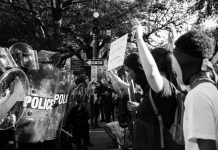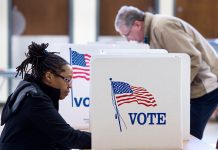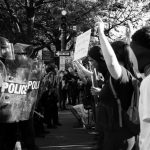Not since Jefferson Beauregard Sessions III tried to have the Department of Justice retry a woman who laughed at him during his confirmation hearing have we seen a story as absurd: Protesters who showed up to express their opposition to Donald Trump’s inauguration face up to half a century in prison for wearing black and for being near those who caused property damage. Yet when it comes to violent protesters in Charlottesville, Trump went out of his way to call neo-Nazis “very fine people?”
Six initial defendants who were there at the “Disrupt J20” protest in Washington D.C. may have had one reprieve from a Judge, but still, face prison time on other counts. Over 150 other people arrested that day face trials as well.
Protesters were initially facing an absurd Draconian punishment of up to 70 years in prison for being in proximity to other protesters who caused property damage. Their ultimate crime appears to have been wearing black clothing, which certainly isn’t mentioned when the Constitution talks about Freedom of Assembly.
A D.C. Superior Court judge, Judge Lynn Leibovitz just threw out the most serious charge: inciting a riot.
“None of them engaged in conduct that amounted to urging other persons to destroy property,” the judge said.
Prosecutors wanted all protesters held accountable for the vandalism and damage caused by a few of the people who assembled, but those on trial weren’t identified as those who became violent. They were nearby and wearing black.
Even though the Judge ruled in favor of the defendants on this one count, the protesters are by no means in the clear.
From the Washington Post:
The defendants still face seven charges, including five felony destruction of property counts, which carry up to 10 years in prison, and two misdemeanor engaging in a riot charges, each carrying up to 180 days in jail.
Chip Gibbons, a writer for The National who wrote about the J20 protest commented on the J20 protests in an interview.
Writing in @thenation, I detail the shocking prosecution of #J20 protesters and its escalating threat to dissent.https://t.co/6yCeh1SMc6
— Chip Gibbons (@ChipGibbons89) October 20, 2017
“This is the most remarkable thing. I mean, one of the main things in the indictment is they’re wearing black clothing,” said Chip Gibbons. “Wearing black clothing is not a crime…”
Gibbons goes on the talk about the “random prosecution,” noting the story of two journalists, including Aaron Cantu, who faces a felony charge of rioting while other journalist’s charges were dropped. Cantu was wearing black clothing.
The case seems outrageous and ridiculous when looked at from an objective point of view. If the same standard applied to Charlottesville, then all of the protesters there that day would have been similarly arrested.
“I don’t know of any other case where people are facing 75 years in prison for protesting, and I don’t know of any other case where such a theory of collective liability has been imposed on people,” said Gibbons.
Think Progress gave a play-by-play of the events in court, and though Judge Leibovitz dismissed the charge of inciting a riot, what happens on the other counts remains to be seen. Her comments indicate she may not be as lenient on the other charges.
“This might be a generational problem I’m having,” Leibovitz said at one point, expressing dismay that marchers in the video “seem entirely non-plussed by some pretty serious violence” in her view. “What am I supposed to take from their apparent indifference to violence?” she said.
The case hasn’t seen media focus even though the charges and the extreme punishment prosecutors seek is incredibly severe. The future of free assembly and the right to protest in a country with a historically unpopular President is at stake.
Featured image: Screenshot via YouTube










